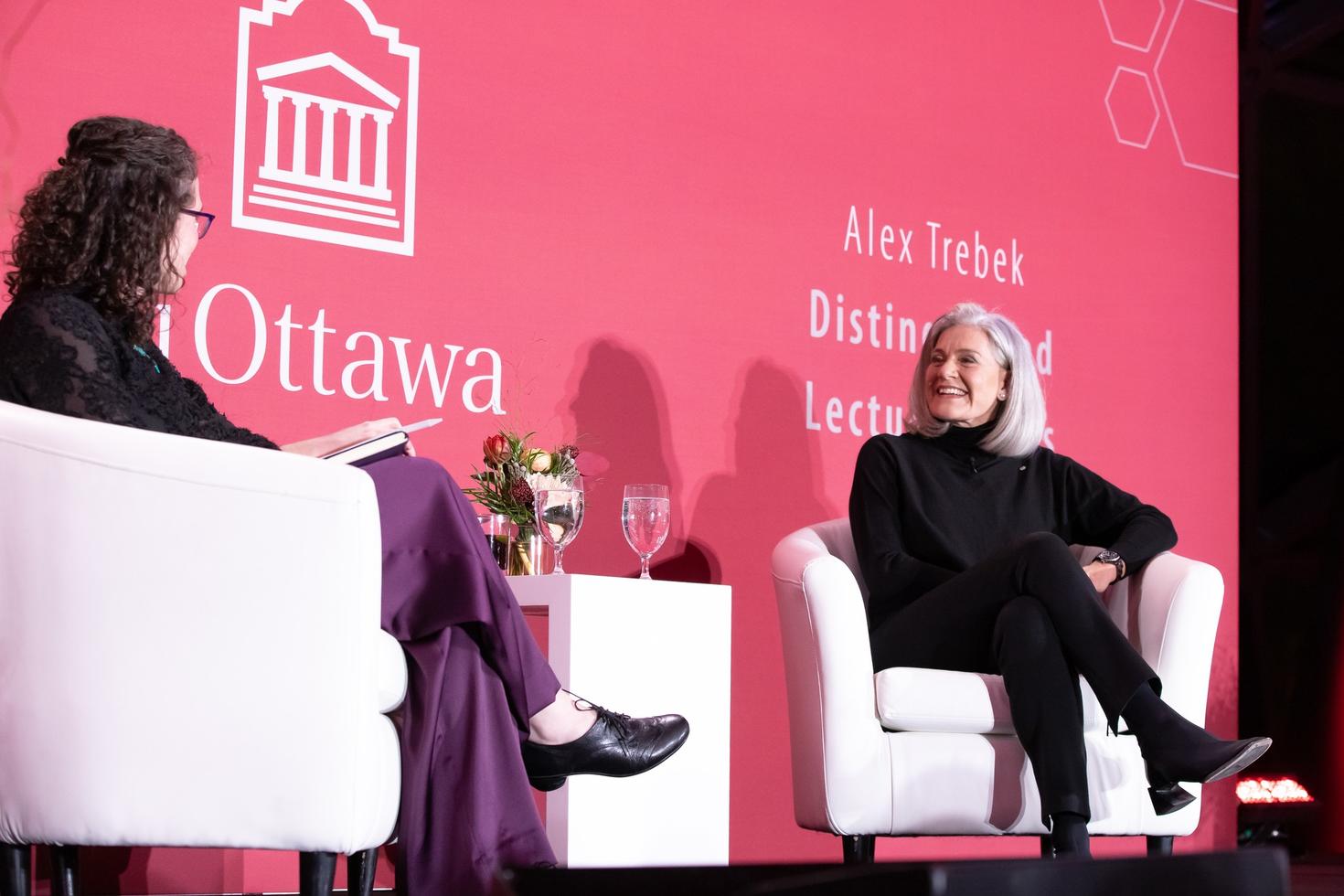Ms. LaFlamme was the keynote speaker for the 2023 Alex Trebek Distinguished Lecture Series. Her fireside conversation with uOttawa communications professor, Dr. Elizabeth Dubois, showcased Ms. LaFlamme’s characteristic warmth and thoughtfulness. Her comments were sometimes funny and lighthearted, while at other times compelled the audience to act in defense of the institution of journalism.
The event was a return to alma mater for Ms. LaFlamme, who is a uOttawa graduate (BA '88) and recipient of an Honorary doctorate (2014). She also received the Alumni Association’s highest honour, the Meritas-Tabaret Award for Alumni Achievement.
Two of this year’s special guests were Jean Trebek, the late Alex Trebek’s wife, and their son, Matthew. Taking the podium, Ms. Trebek said her husband was “truly grateful for the myriad of experiences” he had at uOttawa.
Ms. Trebek also reminded the audience of how much Alex valued the sharing of knowledge. “When we have the chance to listen to another’s point of view it reminds us that we need to stay receptive, be willing to change our preconceptions, and open ourselves to new ideas,” she said.
Bringing the world to Canadians
Ms. Trebek’s remarks were well-aligned with the theme and speaker of the evening. For more than four decades, Ms. LaFlamme has dedicated her life to expanding the worldviews of Canadians, reporting on the most important stories of our generation.
One could suggest that Ms. LaFlamme’s career in journalism started well before she took her first newsroom job. “I wanted to be a foreign correspondent my whole life,” said Ms. LaFlamme, divulging that her childhood was filled with storytelling and writing.
She recalled her first television story, covering a psychic fair for a local news station in her hometown of Kitchener: “I had them read my cards and amazingly, this psychic saw flags of the world. As a 24-year-old local reporter, I could never have dreamed what would unfold. In fact, it makes me a bit emotional because it has been a privilege to cover the world.”
From the September 11 attacks and the subsequent Iraq War to the aftermath of Hurricane Katrina, the election of Pope Francis to the conflict in Ukraine, Ms. LaFlamme is known for her rigorous reporting and ability to highlight the humanitarian side of stories.
“I have always felt that this is about people,” reflected Ms. LaFlamme on her journalism. “When you arrive somewhere, it is the worst moment in their lives. [...] And what I’ve always learned in these darkest moments is the power of the human spirit.”
Ms. LaFlamme went on to talk about a cause that is close to her heart: Championing the rights of women in Afghanistan. She has reported extensively on the Canadian mission in the country as well as the dire situation faced by women and girls under Taliban rule.
Since then, Ms. LaFlamme and her partner have been actively involved in bringing a young woman, Roya Shams (now a uOttawa graduate, BSocSc ’19), and more than 35 of her family members from Kandahar to safe haven in Canada.
In Afghanistan and beyond, Ms. LaFlamme remains engaged in advocacy work. That includes her involvement with Journalists for Human Rights, with whom she has travelled to Kenya and Tunisia to produce a mini-documentary series about how local journalists are changing lives in their communities.
Journalism’s role in protecting democracy
Ms. LaFlamme also reflected on the future of journalism and its role in upholding democracy.
There was no one better to probe insightful remarks than Dr. Elizabeth Dubois, whose uOttawa research examines the political uses of digital media, including artificial intelligence, political social media influencers, and the online harassment of public figures. Dubois asked Ms. LaFlamme about what she thinks has had the greatest impact on the journalism industry.
“Social media, without a doubt, and the rise of misinformation and disinformation,” responded Ms. LaFlamme. “I think that it’s behind the erosion of trust in our public institutions. It’s behind the polarization of societies around the world and in Canada. For female journalists it’s the level of misogyny and toxicity, which is so next level, especially for my racialized friends and colleagues.”
According to Ms. LaFlamme, people and governments need to recognize—and be willing to pay for—the critically important contribution of trained journalists. “Journalism is the elbow grease of democracy,” she explained. “We learn how to differentiate facts from fiction, gather it, put it into context, disseminate it. It’s not just something you can spout off.”
The 2023 lecture included questions submitted by the audience. One was posed by Michelle Hennessey, who holds a bachelors and master’s degree in communication from uOttawa and is a current common law student at the University.
Hennessey asked Ms. LaFlamme about her advice to help women overcome the online hate, harassment, and other barriers they may face in their careers.
“You need a thick skin and then you need to double it,” responded Ms. LaFlamme. “For women, there is definitely a different set of rules. If you are experiencing any kind of harassment, racism, sexism, ageism, call it out. Nothing is going to change if we keep our mouths shut, but there are consequences.”
uOttawa as the foundation for success
In closing, Dubois asked Ms. LaFlamme to share how her uOttawa degree had prepared her for the future. From its proximity to the heart of Canadian politics to its bilingual dimension, Ms. LaFlamme credited uOttawa for building the foundation of her career.
She said her time at the University also helped develop an aptitude that’s especially important in the era of algorithms and fake news: “The most important thing for my career, really, are the critical thinking tools I learned in the communications department at the University of Ottawa.”
